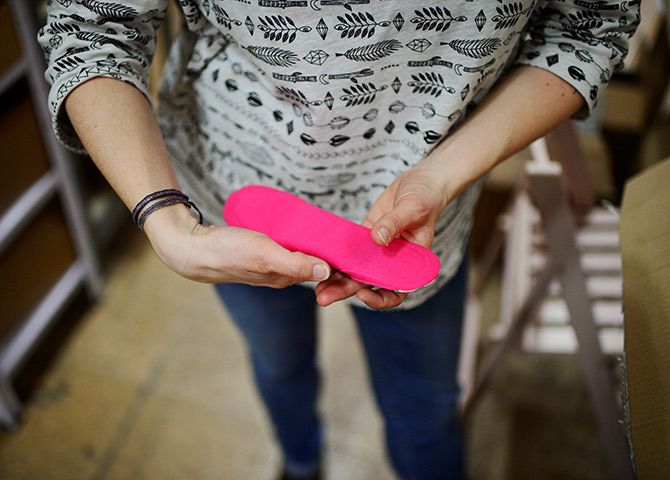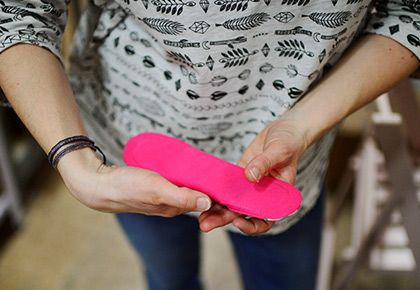 | « Back to article | Print this article |
With schools closing down, many girls and their female family members in rural and urban areas now don't have access to sanitary pads.

Access to menstrual hygiene products for Indian women, especially those in rural areas, has been severely impacted due to the coronavirus pandemic and closure of educational institutions and community organisations has further compounded the problem, a study has found.
The pandemic has also disrupted the production of menstrual hygiene products, with many small and medium scale manufacturing units facing a shortage of labour, raw material and working capital, it said.
The study by the Menstrual Health Alliance of India (MHAI) was released during an online workshop held by Dasra, a philanthropic organisation in partnership with Change.org.
As part of the workshop, the MHAI shared findings from a rapid survey conducted online amongst 67 organisations involved in relief work during COVID-19 across India, Africa and other nations.
The survey assessed the status of production, distribution and access to menstrual hygiene products to understand challenges and propose recommendations for relief work.
The study based upon the findings of the survey stated that 62 per cent respondents indicated that access to menstrual hygiene products through regular channels has become challenging, while 22 per cent said they did not have access at all.
"Closures of educational institutions and community organisations have further exacerbated supply issues," the study said.
The MHAI estimates India has 336 million menstruating women, of which 121 million use sanitary pads, i.e. 1 billion pads per month.
According to the study, the pandemic has disrupted not only the supply of menstrual hygiene products but also their manufacturing and distribution.
"With production becoming constrained, availability at the last mile rural retail points is most affected. Consumers who could access products at block or district level markets are unable to do so due to lack of public transport and mobility restrictions under lockdown," it said.
With schools closing down, many girls and their female family members in rural and urban areas now don't have access to sanitary pads, it added.
Tanya Mahajan, coordinator, MHAI said production and distribution of information and products to manage menstrual hygiene demands of women and girls is a constant challenge.
"In our recent survey with NGO partners, 84 per cent stated that there is either no or severely restricted access to menstrual products in communities that they work in, especially for sanitary pads," she said.
"Fifty per cent of the small and medium scale manufacturers reported that they are unable to operate at capacity and 25 per cent are not operational at all. Availability of labour, raw materials and working capital are all looming concerns for these units," she said.
Mahajan said most adolescent girls from low-income households depend on school-based supply of menstrual hygiene products.
"Given that schools have been closed since the lockdown, they have started using cloth pads. We need to look at how reusable product choices like cloth pads and menstrual cups can be promoted with information on maintenance of hygiene in order to build resilient MHM (menstrual hygiene management) practices," she said.
Before the pandemic, 89 per cent of the organisations that were surveyed were reaching the community through community-based networks and organisations, the study said.
Sixty-one per cent were distributing menstrual products through schools, 28 per cent through door-to-door retail, 26 per cent through online retail channels and 22 per cent through traditional retail stores (FMCG and pharmacists), it said.
Post-pandemic and with physical distancing measures in place, 67 per cent organisations have had to pause normal operations.
Given the current national lockdown measures and uncertain working conditions owing to social distancing and reverse migration, the access to menstrual hygiene products is expected to reduce further, the study said
